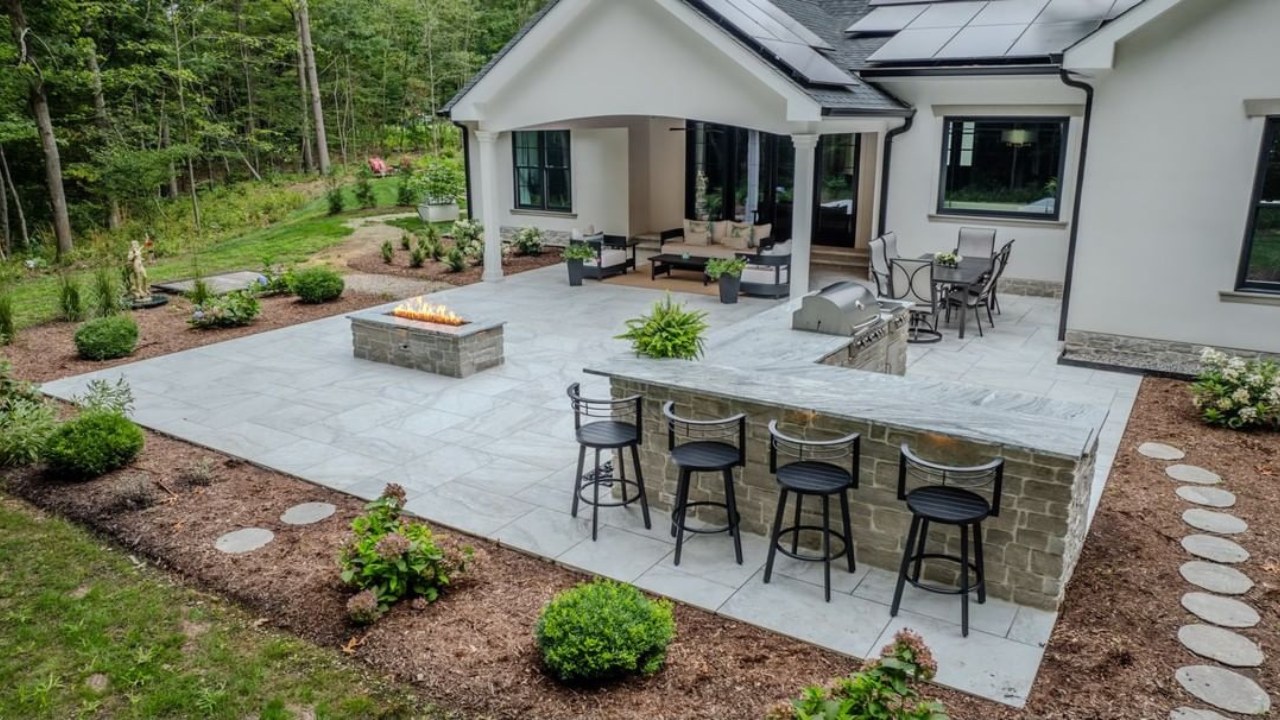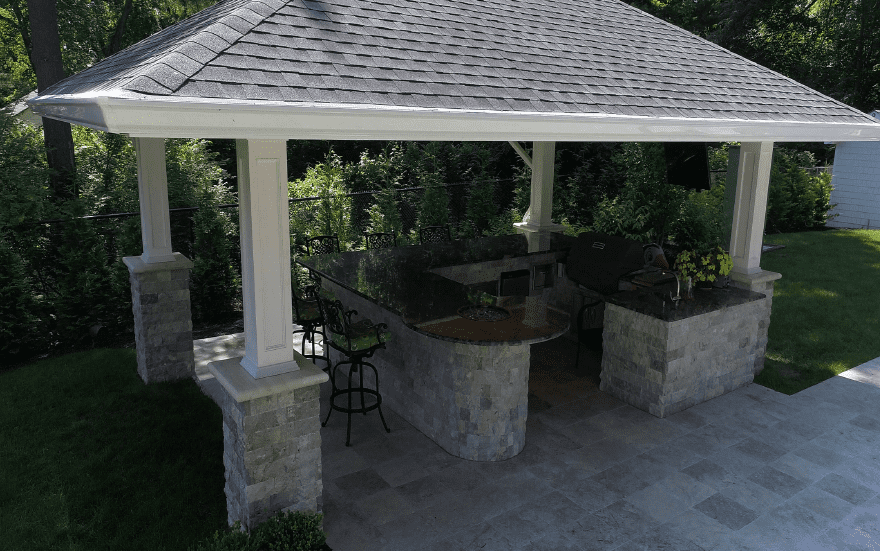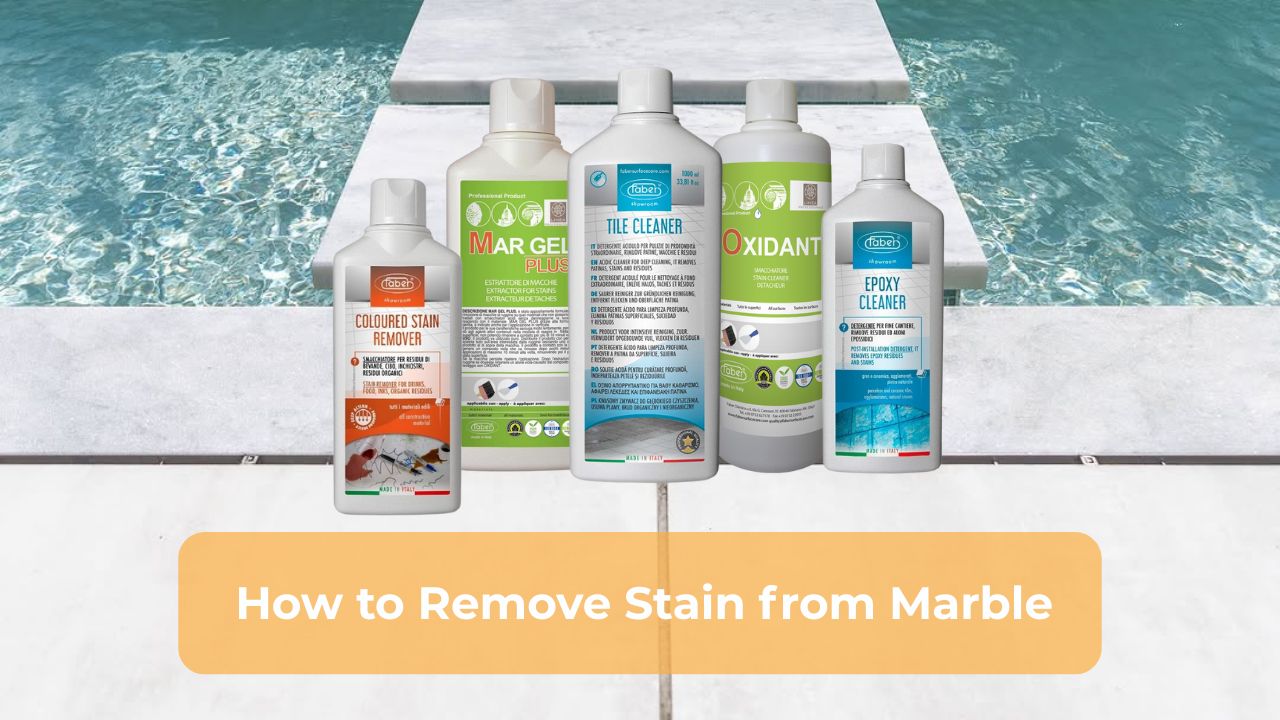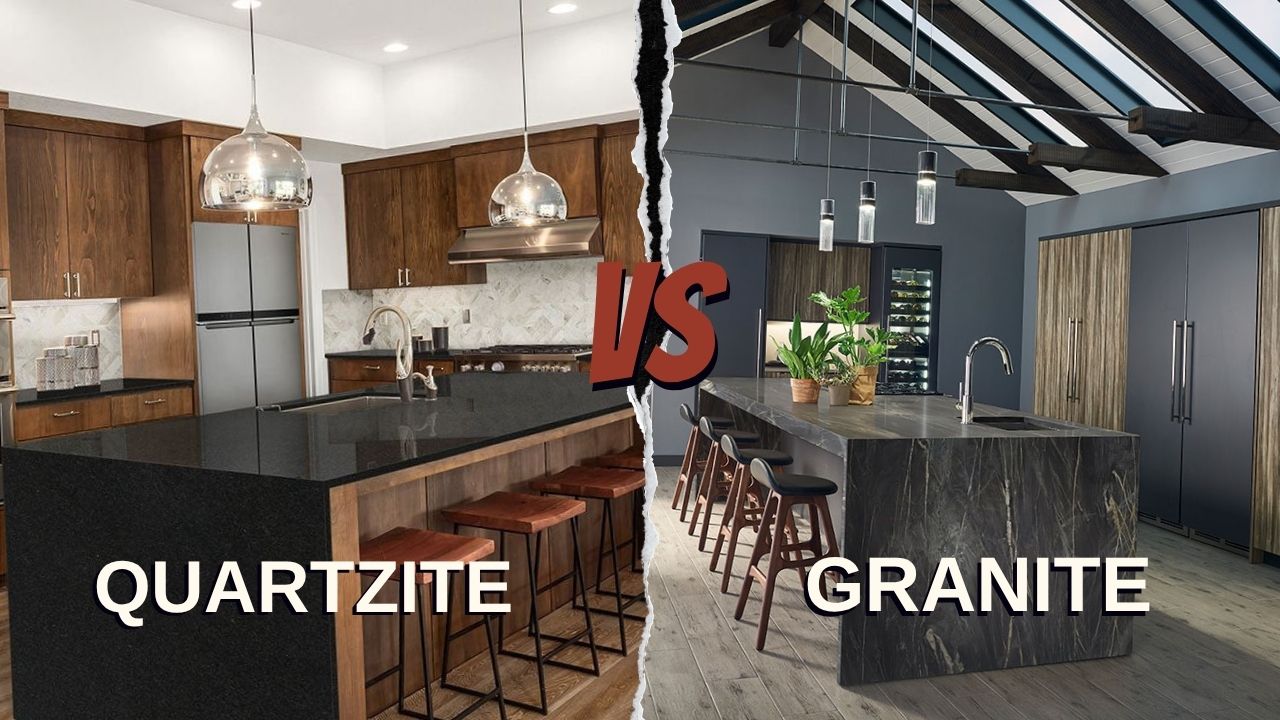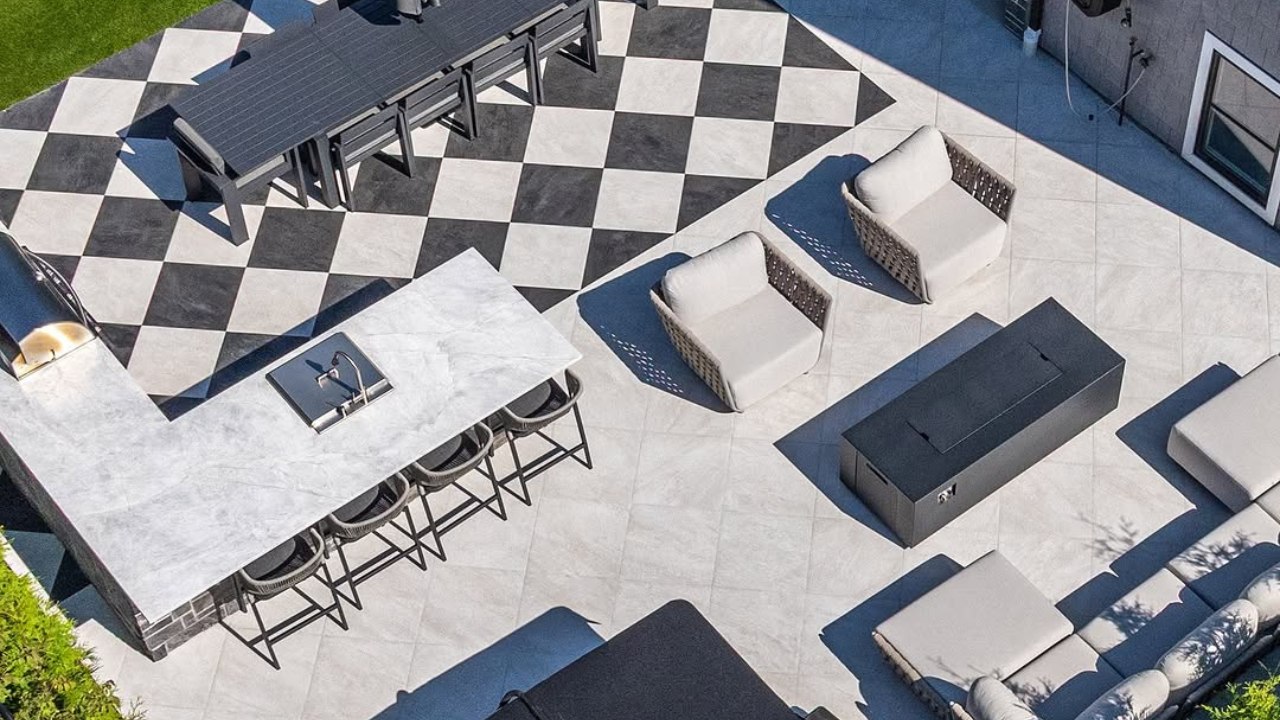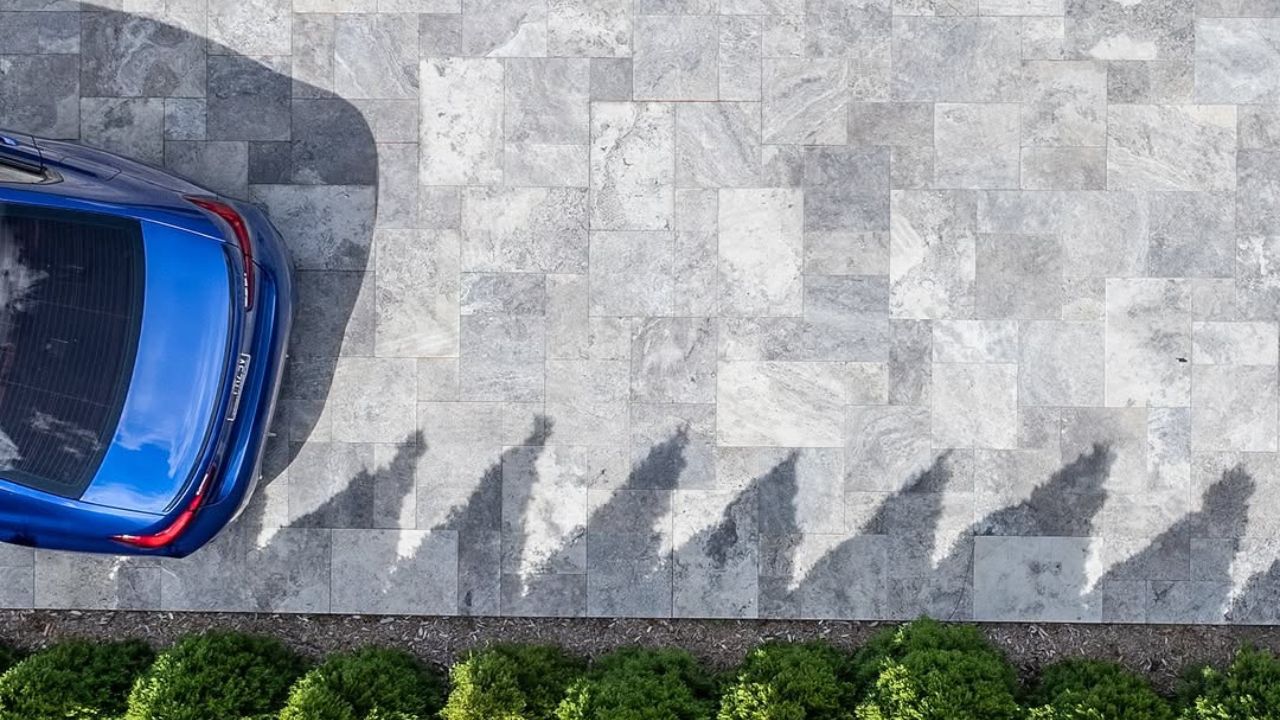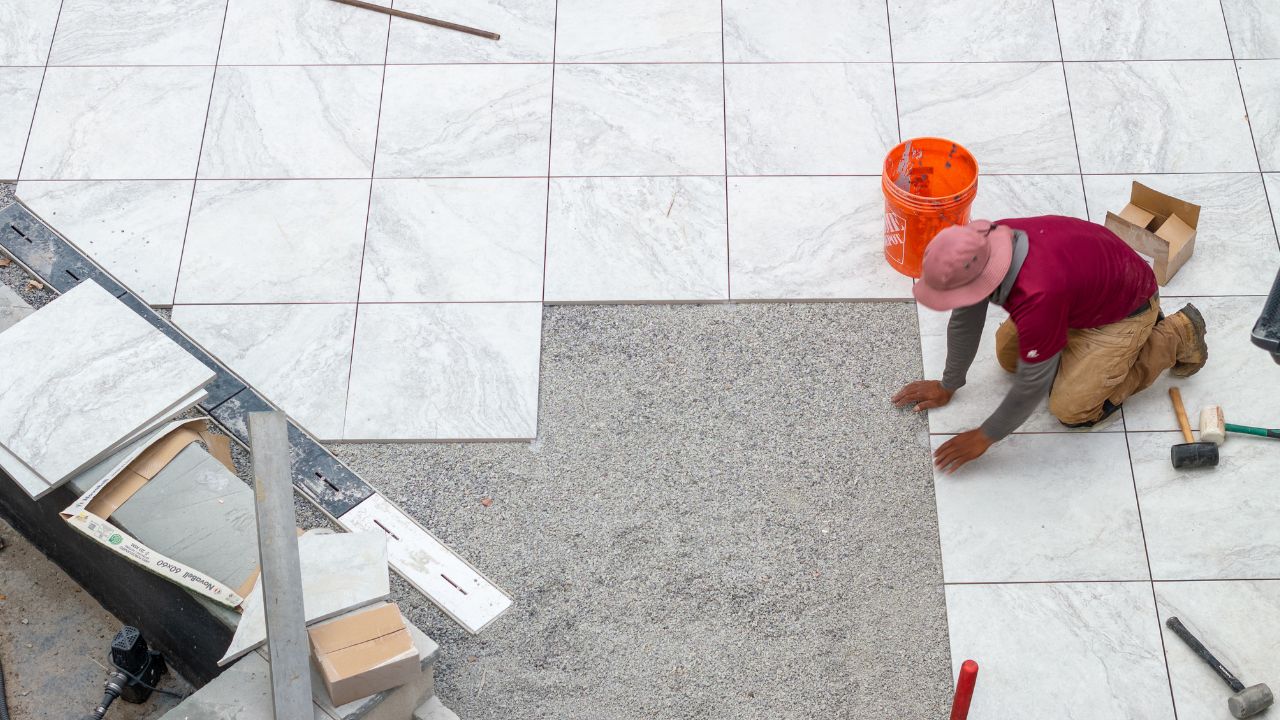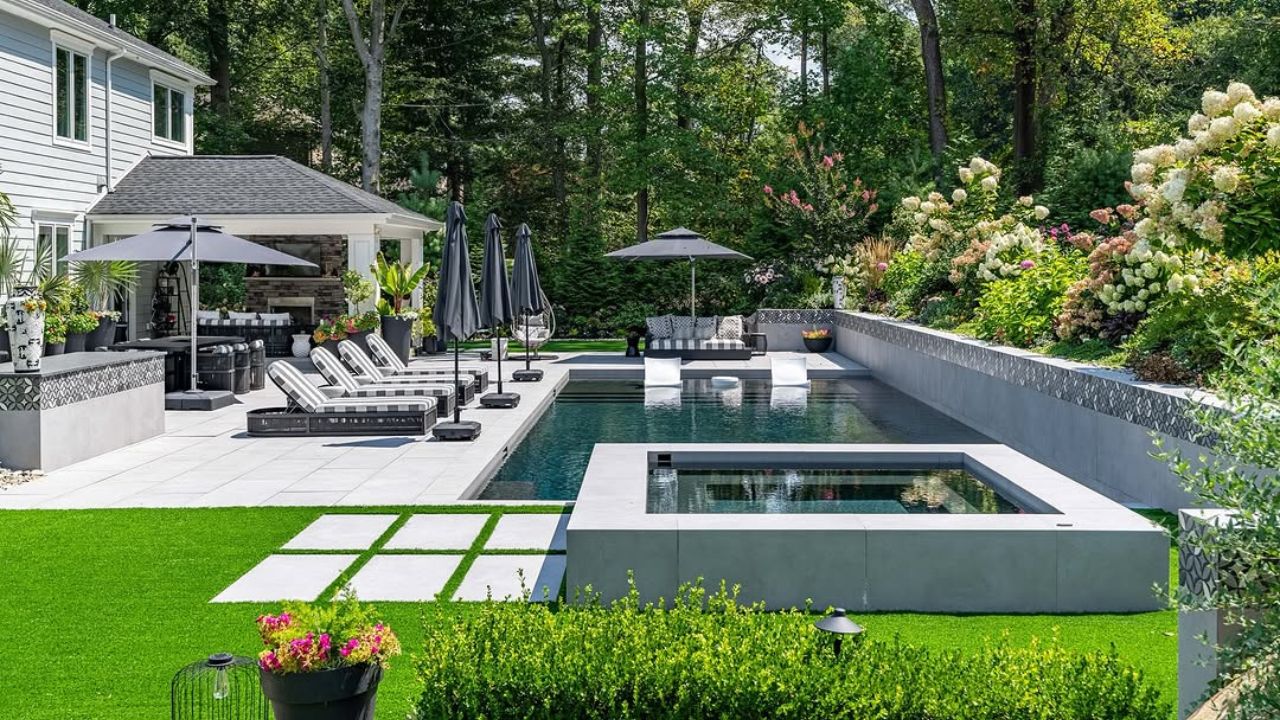Outdoor kitchen flooring ideas have become a norm of modern living, and they are not a separate part of the home. They are an extension of existing living space, so choosing the right material for outdoor use also matters here. However, homeowners and even project managers often wonder what’s the best flooring for outdoor kitchen areas. Not because they don’t know, it’s because there are too many options. The right flooring for an outdoor kitchen should have a balance of performance and aesthetics. Here is how you can find out.
Outdoor Kitchens Flooring Options Explained
The outdoor kitchen floor requires rugged performance at its core. Due to its location, they have to face harsh weather conditions, direct sunlight, and other elements that require durability, strength while being beautiful. The following are our picks for the best flooring for outdoor kitchen areas.
Porcelain Pavers
Porcelain pavers are the best choice for outdoor kitchens. They are crafted for outdoor use. They feature a tough and durable surface that is non-porous. In its honed or textured look, it offers traction and slip resistance and withstands heavy foot traffic, which makes it safe around grills and sinks. Among the best features of porcelain tile and pavers, its aesthetic versatility stands out.
You can find them in wood-look, stone-look, and concrete-look styles. Outdoor Porcelain slabs can create an uninterrupted look for your outdoor kitchen area without any grout lines. We recommended porcelain pavers for outdoor kitchen floors due to it’s adaptability to any design. Low maintenance also makes it a long-term choice for outdoor floor as the best flooring for outdoor kitchen areas.
Pros Of Porcelain Pavers:
- Weather-resistant and frost-proof
- Low maintenance, easy to clean
- Wide design range
- Slip-resistant textures available
Cons Of Porcelain Pavers:
- Higher upfront cost than concrete
- Requires professional installation for best results
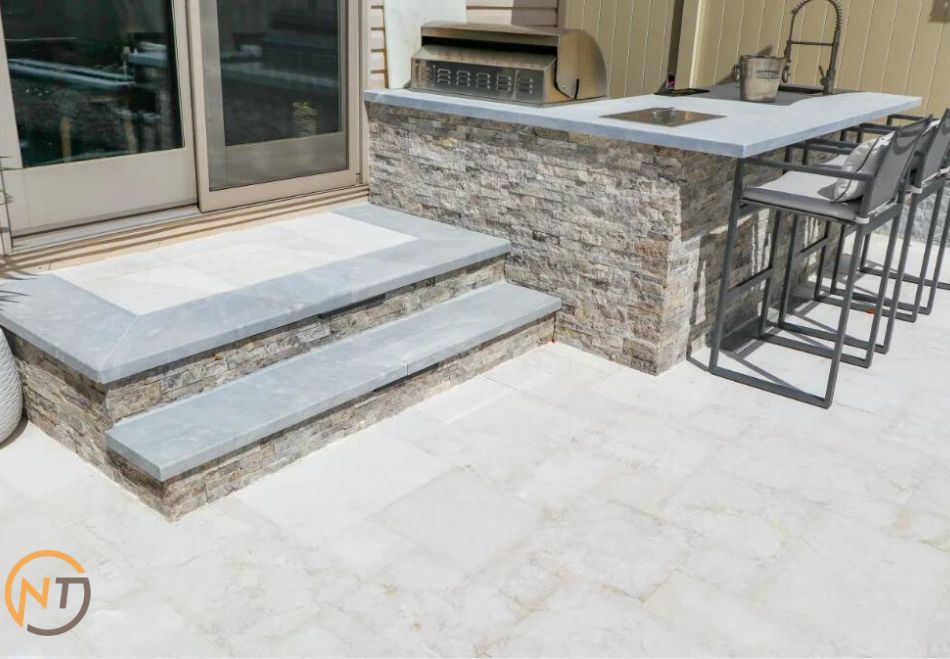
Natural Stone
Natural Stone adds a natural elegance and ageless beauty to your outdoor kitchen area. Some natural stone pavers suit the outdoor kitchen flooring, like Granite, Travertine, and Limestone. Granite withstands heavy use and resists scratches. Travertine floor stays cool in hot climates, which is a practical feature for outdoor cooking areas. Limestone offers softer tones and blends seamlessly with landscapes.
However, natural stone flooring requires sealing to prevent stains and weathering, but the natural variation of stone ensures a unique look.
Pros Of Natural Stone:
- High durability with proper sealing
- Natural variation enhances luxury appeal
- Heat-resistant, ideal for sunny climates
Cons Of Natural Stone:
- Requires sealing to resist stains
- More expensive than other materials
- May feel uneven depending on stone choice
Sealed Concrete
Concrete is gaining popularity in modern outdoor kitchens due to its affordability. The stamped concrete is a versatile material that allows texturing, polishing, and staining to create a distinct look and finish. Unlike regular concrete flooring, sealed concrete resists moisture and grease way better. What makes it another good flooring for outdoor kitchen areas is its overall minimal look. It can look well with contemporary or industrial styles, where clean lines and durability matter. Regular resealing with a good-quality penetrating sealer around the year maintains its strength and appearance.
Pros Of Sealed Concrete:
- Affordable compared to natural stone
- Highly customizable finishes
- Strong load-bearing capacity
Cons Of Sealed Concrete:
- Requires resealing every few years
- Can crack with temperature extremes
- Less slip resistance when polished smooth
Brick Pavers
Brick brings a rustic, traditional atmosphere to outdoor spaces. Its natural texture provides slip resistance and an organic feel. It withstands outdoor conditions and though in wet climates. However, it may need more maintenance. For outdoor kitchens, brick complements classic designs, especially when paired with wood pergolas or stone accents.
Pros Of Brick Pavers:
- Slip-resistant
- Distinctive, rustic charm
- Durable under heavy furniture
Cons Of Brick Pavers:
- Can absorb grease stains
- Requires more maintenance in wet climates
- Limited style options compared to porcelain
Composite Decking
One of the best floorings for outdoor kitchen areas is composite decking, which is perfect for kitchens on patio decks. It is made from wood fibers and recycled plastics. It is much durable than original wood that resists insects, rot, and moisture. It works best in the kitchens in coastal or humid areas where wood struggles to sustain.
Pros Of Composite Decking:
- Low maintenance, no sealing required
- Resistant to rot, mold, and termites
- Comfortable underfoot
Cons Of Composite Decking:
- Not as heat-resistant as stone or porcelain
- Limited color range
- Can scratch under heavy furniture
Comparison Of Best Flooring Options for Outdoor Kitchens
Not all materials are equal, and some work better than others. So, here is the comparison of the materials so you will understand even better. This will help you to make an informed decision.
| Material | Durability | Slip Resistance | Maintenance | Design Style Fit |
| Porcelain Pavers | Excellent | High | Low | Modern, transitional, classic |
| Natural Stone | High | Medium | Medium–High | Luxury, organic, rustic |
| Sealed Concrete | Good | Medium | Medium | Industrial, modern |
| Brick Pavers | Good | High | Medium–High | Traditional, rustic |
| Composite Decking | Good | Medium | Low | Coastal, casual |
At NT Pavers, we often recommend using porcelain pavers. Because we know our clients don’t just focus on upfront cost, but the longevity and performance too. Porcelain pavers or slabs may have a higher upfront cost, but the benefits are huge. From durability, resistance against moisture and staining to a rugged surface, porcelain offers long-term benefits.
What Are The Considerations for the Outdoor Kitchen Flooring Options?
When you are about to select flooring material for your outdoor then make sure the selected material complements the outdoor living requirements, from resisting temperature changes to stain and crack resistance.
| Consideration | What to Look For | Best Material Matches |
| Climate | In hot climates, cooling surfaces like travertine work well. Freeze–thaw regions require durable porcelain pavers or granite. | Travertine, Porcelain, Granite |
| Slip Resistance | Crucial near sinks, grills, and prep areas to reduce accidents. | Porcelain (textured), Travertine, Slate, Composite |
| Maintenance | Low-maintenance choices save time for busy households. | Porcelain, Composite Decking, Concrete |
| Design Style | Match flooring to the home’s architecture—rustic vs. modern aesthetics. | Brick, Natural Stone, Concrete, Porcelain |
| Budget | Balance performance with cost—premium stones cost more, porcelain is versatile. | Porcelain, Concrete, Granite |
| UV Resistance | Prevents fading in sun-exposed outdoor kitchens. | Porcelain, Travertine, Composite |
| Heat Retention | Some materials stay cooler underfoot, improving comfort. | Travertine, Light-Colored Porcelain |
| Eco-Friendliness | Recyclable or sustainably sourced flooring supports green design. | Recycled Concrete, Eco-Pavers, Natural Stone |
| Installation | Materials vary in difficulty and cost of installation. | Interlocking Porcelain Pavers, Concrete Slabs, Brick |
How to Maintain Outdoor Kitchen Floors?
Regular maintenance, even when the material itself is low maintenance, can add life to your outdoor kitchen floor. Maintaining the floor in the outdoor kitchen area depends on the material, such as:
| Flooring Material | Maintenance Tips |
| Porcelain Pavers | Sweep debris weekly, hose down monthly, and use mild soap for grease. Sealing is not required. |
| Travertine & Natural Stone | Apply penetrating sealer every 1–2 years, avoid acidic cleaners, and wash with pH-neutral soap. |
| Granite | Seal annually, clean with stone-safe detergent, and wipe spills quickly to prevent staining. |
| Concrete (Stamped or Polished) | Re-seal every 2–3 years, pressure wash occasionally, and remove oil stains promptly. |
| Brick Pavers | Re-sand joints when needed, seal every few years, and scrub moss or algae with a stiff brush. |
| Composite Decking | Hose down regularly, use a soft brush and soapy water for stains, no sealing required. |
However, the general maintenance includes:
- Frequent sweeping can prevent dirt buildup and surface scratches.
- Washing after heavy use is recommended, especially after grilling or outdoor parties.
- Applying a good-quality penetrating sealer to natural stone can improve its life and performance.
- Do not use harsh chemicals and stick to pH-neutral cleaners to protect the surface.
- Good drainage is crucial as it prevents water damage and algae growth.
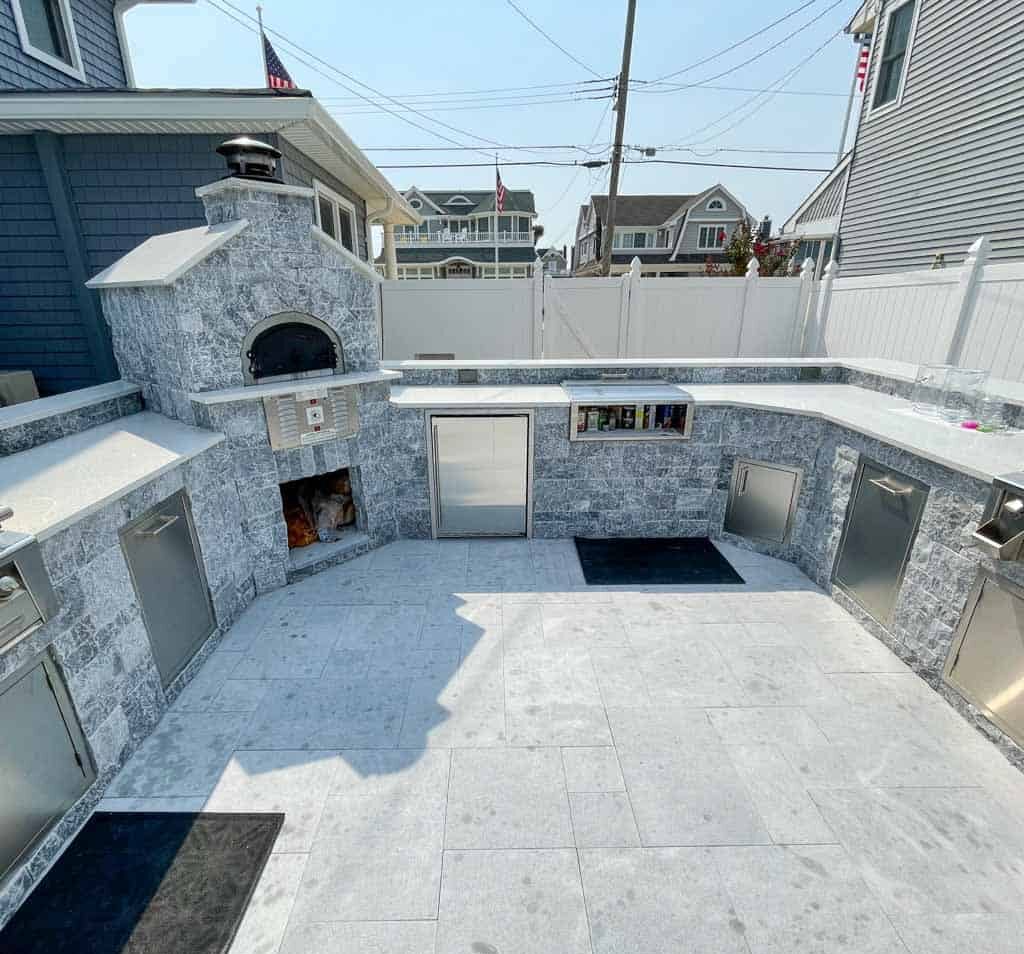
FAQs About Best Flooring Options for Outdoor Kitchens
Let’s answer your most asked questions about the best flooring options for outdoor kitchens.
What is the most durable flooring for an outdoor kitchen?
Porcelain pavers and granite are the most durable. They resist scratches, heat, and moisture.
What flooring stays coolest in hot climates?
Travertine and lighter-colored porcelain pavers remain cooler under direct sunlight.
Is concrete a good choice for outdoor kitchens?
Yes. It offers strength and design flexibility but requires regular maintenance to prevent staining and cracking.
Can wood be used for outdoor kitchen flooring?
No. Natural wood requires frequent maintenance and cannot withstand harsh weather conditions.
Which outdoor kitchen flooring is the most low-maintenance?
Porcelain pavers and composite decking require minimal maintenance.
Is slip-resistant flooring for outdoor kitchens important?
Yes. Grease and water spills are common in outdoor kitchens. Slip-resistant finishes ensure safety.
Bottom Line
The best flooring for outdoor kitchen areas requires a balance of performance with beauty. Porcelain is the best choice for the outdoor kitchen flooring because of its durability and aesthetic versatility. Natural stones add an evergreen charm to your kitchen flooring, but they require maintenance. Concrete and brick are on the economic side, but they cannot withstand the weather without sealing. Make sure to select the right material for your outdoor kitchen flooring.
Make sure to get your material from a reputable natural stone supplier in New Jersey, like NT Pavers, so you know what you are paying for.

